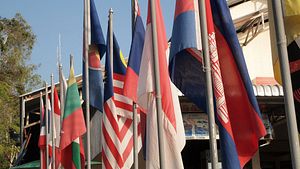Pervasive and deep-rooted corruption constitutes a major challenge for economic growth and development in the ASEAN region. According to the World Bank’s corruption indicators, there has been very little progress in the fight against corruption in the region during the last five years – corruption is still prevalent at high levels in the majority of countries.
This risks jeopardizing the capacity of countries in the region to attract foreign direct investments, and may favor investments that undermine both the rule of law and the quality of services provided to regular citizens. The recent Rolls Royce case in Thailand is a good example. It involved the alleged bribing of state officials and Thai Airways employees to secure contracts worth millions of dollars for the British multinational firm.
At the same time, accelerating economic integration, increasing trade volumes, and higher growth rates are expected to aggravate the problem. Evidence shows that corruption is a major driver of illicit activities and transnational organized crime in the Southeast Asian region. According to our research, illicit markets in East Asia and the Pacific, such as counterfeit goods, illegal timber trafficking, drug trafficking, e-waste, migrant smuggling and trafficking in persons, generate a combined annual income of approximately $100 billion a year. The increase in commerce and free movement of capital or people across borders brought about by the ASEAN Economic Community could also have the unintended effect of exacerbating these issues, and increasing the scope for corruption to thrive.
These challenges require a coordinated response at the national, regional, and global levels. The United Nations Convention against Corruption, or UNCAC, which has been ratified by all countries in the region, provides a broad set of instruments to conduct the anti-corruption fight. But in order to be effective, it has to be implemented seriously and in a coordinated matter – through a combination of well-designed strategies, legislation, and reforms at the national level.
To this end, the heads of Anti-Corruption Agencies and other high-level officials from across Southeast Asia will gather this week in Bangkok to identify the most pressing areas for interventions at national and regional levels and to produce a strategic roadmap for anti-corruption in ASEAN until 2020. This is a hugely important process, but the factor that may be most decisive is how effectively countries in the region are able to implement this roadmap.
UNCAC covers preventative measures, criminalization of corruption offenses, mutual legal assistance, and asset recovery. It requires signatory countries to reform their domestic laws and build their institutional capacities to comply with the provisions in the treaty. The progress of its implementation is reviewed on a regular basis in each State Party to the Convention.
A review recently conducted of ASEAN members, covering issues from criminalizing corruption to international cooperation among law enforcement authorities, highlighted a large number of shortcomings in regional anti-corruption systems that are undermining the efforts of governments to limit the impact of this phenomenon. For example, in the domestic legislation of several countries, the bribery of foreign public officials is not criminalized, and the liability of legal persons is not established.
This is a major problem for foreign investors, as they have to compete against companies that in practice are not held accountable for bribing public officials to be awarded contracts. Whistle-blower protection is also effectively missing, making it extremely challenging to gather information and evidence on corruption cases.
In addition, we know that proceeds of corruption are often laundered abroad. The Southeast Asian region has lost an estimated $210 billion in illicit financial outflows since 2004, according to Global Financial Integrity, a U.S. based research organization). To put these numbers in perspective, Southeast Asian countries had an average per capita income of $10,638 in 2013. Investigative operations and cooperation frameworks to recover stolen assets and address money laundering at the international level are therefore undermined by inconsistent legislation, and varyingly scarce capacities throughout the region.
This is why the regional conference being held this week is so important. It will devise the strategies required for detecting, investigating, and prosecuting corruption; preventing money-laundering; preventing and detecting the transfer of proceeds of crime and recovering stolen assets; and enhancing transparency and accountability of public services. But to have any hope on curbing corruption and its adverse effects, the region will need to remain steadfast on effectively implementing these measures in a coordinated manner.
Francesco Checchi is the Regional Anti-Corruption Adviser for Southeast Asia at the United Nations Office on Drugs and Crime.
































